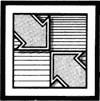 Readers'
Feedback
Readers'
FeedbackThe Editors and Readers of COMPUTE!
If you have any questions, comments, or suggestions you would like to see addressed in this column, write to "Readers' Feedback," COMPUTE!, P.O. Box 5406, Greensboro, NC 27403. Due to the volume of mail we receive, we regret that we cannot provide personal answers to technical questions.
An American Computer In Paris
M. H. Trenker's question about using American computers in Europe ("Readers'Feedback," November 1986) rang a familiar note with me, since I faced a similar situation during the last year when I used a Commodore SX-64 in Paris. Your suggestions are correct, but I have some additional practical advice.
If you use a 200 volt/110 volt transformer, make sure it is rated at a minimum of 200 watts so that it can handle the load of a computer and all of its peripherals. I found it quite difficult to locate a female 110 volt plug adapter for the computer end of the transformer in Europe, so you may want to look for that item before you leave the United States. Another useful item is a highquality surge-protector/line-filter power strip. Power-line fluctuations in some European cities are equal, at best, to rural conditions in North America. My experience is that all of these items are considerably cheaper in the U.S. than in Europe, so don't leave home without them.
I encountered no problems in running software, including copy-protected commercial programs, on my Commodore SX-64 with internal 1541 disk drive. I have not used a 1571 drive in Europe, but I suspect that drive would be just as forgiving as the 1541 in using 50 Hertz current. Given the rather finicky nature of Commodore drives, I would avoid having a drive adjusted unless necessary.
If possible, insist that all of your equipment, including computer, peripherals, and disks, be hand searched rather than X-rayed at airport security locations. Airport X-ray machines may not damage magnetic media under normal circumstances, but all too often they are out of adiustment or set at excessive power levels which can damage disks and erasable ROM chips. Don't forget that printers and printer interfaces contain ROM chips, too.
On the bureaucratic front, you should be aware that some countries, particularly those in Eastern Europe, place restrictions on the import and export of high-technology items. In the worst case, equipment brought in without proper authorization might be confiscated as illegal contraband. To facilitate entry into a European country, try to obtain a letter from an official European source (a school, business, or whatever) stating that your computer system is entering the country strictly for your temporary, personal use and that the entire system will leave the country when you do. To facilitate return to this country, you should also register your equipment with the United States Customs office before you leave.
Mario Sergio Bernardo
Thank you for the advice. The next two letters contain suggestions from other overseas readers.